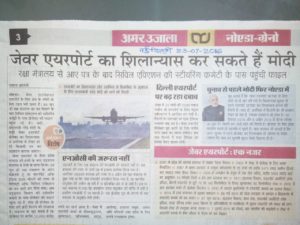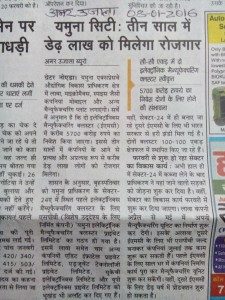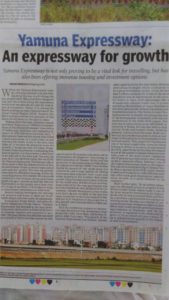Metro may go to Jewar, plan to extend Greater Noida Line
GREATER NOIDA: In order to provide connectivity to the rapidly urbanizing area, the Yamuna Expressway Industrial Development Authority (YEIDA) is working on a feasibility plan to put the Metro on track up to Jewar.
The proposed 48- to 50-km Metro track is estimated to come at a cost of Rs 2,000 crore and will be aligned at the road level along the Yamuna Expressway.
According to officials, a proposal to prepare a techno economic feasibility report (TEFR) for the proposed project, which will run between Pari Chowk in Greater Noida and Jewar, will be sent to the Delhi Metro Rail Corporation (DMRC) soon.
“Currently, we are working out the feasibility of the project,” said Santosh Yadav, CEO, YEIDA. “We will also put together the terms of reference to prepare the TEFR, and send it to the DMRC,” Yadav told TOI.
Once the TEFR is in place, the DMRC will also prepare the detailed project report (DPR) for the proposed Metro route, Yadav further said. “Once we have both in place within the next few months, we will take the project ahead,” he said. The proposed line is expected to not only provide a fast link between the two townships of Greater Noida and YEIDA but also bring these places closer to the national capital by boosting connectivity.
According to officials, the proposed Metro route will come at an estimated cost of about Rs 2,000 crore. The cost for putting in place an elevated Metro track is estimated at about Rs 200 crore/km. By the same formula, the YEIDA Metro should cost more than Rs 9,000 crore. However, YEIDA is studying the feasibility and financial viability of running the Metro at the road level along the expressway. This will bring down the cost to almost Rs 40-50 crore/km. The Authority CEO said, “The population in Greater Noida and YEIDA is set to increase considerably. Besides, several new housing schemes are in the pipeline. Considering that thousands of more people will inhabit the area, the Metro link will prove very useful. It will also serve the several proposed residential, industrial and IT units along the expressway”.
In February last year, a 20.6-km Metro rail route between Greater Noida and YEIDA was proposed. The proposed track was expected to run along the Yamuna Expressway between Pari Chowk in Greater Noida and Sector 22 in the YEIDA area.


